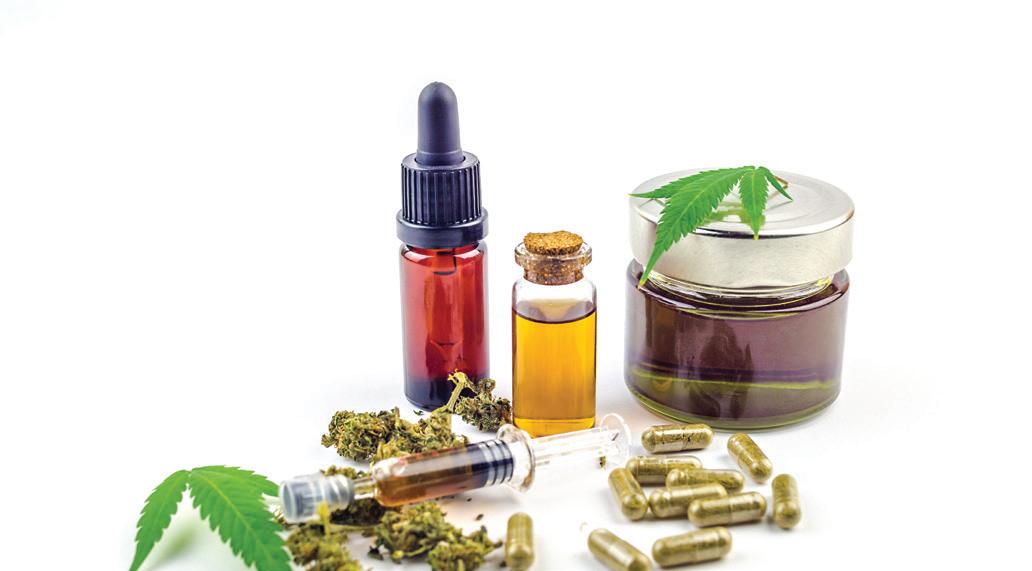
5 minute read
SPASTICITY
SPASTICITY BY BEN OWENS
Spasticity is one of the most common symptoms of multiple sclerosis (MS) and can also be caused by diseases and conditions such as cerebral palsy and strokes or as a result of nerve trauma. 1 Spasticity causes muscle stiffness and spasms that can be debilitating and affect quality of life. THC and CBD have been shown to be an effective treatment for spasticity in early studies. 2,3
Advertisement
Spasticity is defined by the National Institute of Neurological Disorders and Stroke (NINDS) as “A condition in which there is an abnormal increase in muscle tone or stiffness of muscle, which mightinterfere with movement, speech, or be associated with discomfort or pain.” 1 It is typically a result of brain and/or spinal nerve damage like that caused by MS, and is one of the most common symptoms of MS.
According to NINDS, symptoms include “Hypertonicity (increased muscle tone), clonus (a series of rapid muscle contractions), exaggerated deep tendon reflexes, muscle spasms, scissoring (involuntary crossing of the legs), and fixed joints (contractures).” 1 These symptoms can lead to negative emotional issues, make regular tasks difficult and make social settings hard to handle. Spasticity “often interferes with daily activities.” 1
Current treatment for spasticity largely involves managing the symptoms as best as possible using a variety of drugs. Some question the lack of evidence supporting effectiveness and the undesirable side effects of these drugs. Some drugs are known to increase muscle weakness and fatigue in an attempt to manage spasticity, two symptoms of MS that would be worsened if affected by these side effects. 4
“There is no cure for motor neuron disease, so improved symptom control and quality of life are important for patients,” Dr. Nilo Riva from the San Raffaele Scientific Institute in Milan, Italy, told Science Daily. Dr. Riva’s research has since shown promising results for alternative treatment options such as cannabis products. 4,5

Researchers like Dr. Riva are finding cannabinoids are an effective treatment for spasticity in motor neuron diseases like MS, ALS and PLS. 3,4,5,6,7 It should come as no surprise then that spasticity is a qualifying medical condition in almost every state with a medical cannabis program. 8 Literature reviews that have been conducted on the topic of cannabis’ role in managing spasticity associated with MS concluded that the existing body of research on endocannabinoids and cannabinoids “Could lead to the development of promising models for the therapy and management of disabling symptoms of the disease.” 7 Research has shown that oral sprays containing mixtures of THC and CBD, the main cannabinoids found in the cannabis plant, can be effective when administered to patients with MS. 2 One study reported more than 80% of participants experienced a 20% or greater improvement in their spasticity, with 40% of participants reporting greater than 30% improvement in their condition. 3 Another study concluded that CBD may prove viable for patients with MS to “Reduce fatigue, pain, spasticity, and ultimately improve mobility,” 6 helping to manage not only spasticity but other symptoms associated with MS.
All of the research to date reiterates the need for future studies on spasticity, MS, and cannabinoids. Currently, studies show that if you have access to cannabis products, specifically those high in THC and CBD, they could help with managing the symptoms of spasticity and conditions like MS. 3,4,5,6,7 Depending on where you live, spasticity may qualify you to have access to medical cannabis if it is legal in your area. If you’re considering adding cannabis to your treatment plan, talk with your physician or care specialist about specific recommendations unique to your medical needs.
BY ANTONIO DEROSE FITNESS + CANNABIS CAN CANNABIS ENHANCE PERFORMANCE IN ATHLETES?
As an athlete who consumes cannabis and educates about the science behind its athletic benefits, I get this question a lot. Is cannabis a PED (Performance Enhancing Drug)? Performance enhancing drugs are any prohibited substances used by athletes to improve athletic performance. Although cannabis has many health and wellness benefits for athletes, it is technically not a performance enhancing drug. CBD was even officially removed from WADA’s (World Anti-Doping Association) list of prohibited substances, starting on January 1, 2018.

In 2017, there was a systematic review published in the Journal of Science and Medicine in Sport, focused on the research available regarding cannabis and exercise performance in sports. At the time, it concluded “Only 15 published studies have investigated the effects of THC in association with exercise protocols. Of these studies, none showed any improvement in aerobic performance”, and that “THC does not enhance aerobic exercise or strength.” 1 Despite this, THC still remains on WADA’s prohibited substance list.
There have also been studies on the effects of cannabis in relation to athletic performance. One study, published in 2018, in the American Thoracic Society Journals included a randomized controlled trial of people with COPD (Chronic Obstructive Pulmonary Disease). Part of their objective was “To test the hypothesis that inhaled vaporized cannabis would alleviate exertional breathlessness and improve exercise endurance.” 2 This clinical trial only had 16 participants, but after measuring single inhalation doses of vaporized cannabis against breathlessness intensity during exercise, it was concluded “Cannabis had no clinically meaningful positive or negative effect on airway function, exertional breathlessness, and exercise endurance in adults with advanced COPD.” 2
A more recent literary review of research, concerning the relationship between cannabis use and athletic performance, was published in the Clinical Journal of Sports Medicine in 2018. It too, concluded cannabis doesn’t enhance athletic performance. “Although cannabis use is more prevalent in some athletes engaged in high risk sports, there is no direct evidence of performance enhancing effects in athletes.” However, they also suggested, “The potential beneficial effects of cannabis as part of a pain management protocol, including reducing concussion related symptoms, deserve further attention.” 3
This ties right back into the several health and wellness benefits athletes can get from consuming cannabis, but at the same time, further solidifies cannabis is not a PED. With more research being conducted every year, it’s only a matter of time before WADA removes cannabis from its prohibited substance list as the world continues to recognize the natural benefits of cannabis for athletes.










